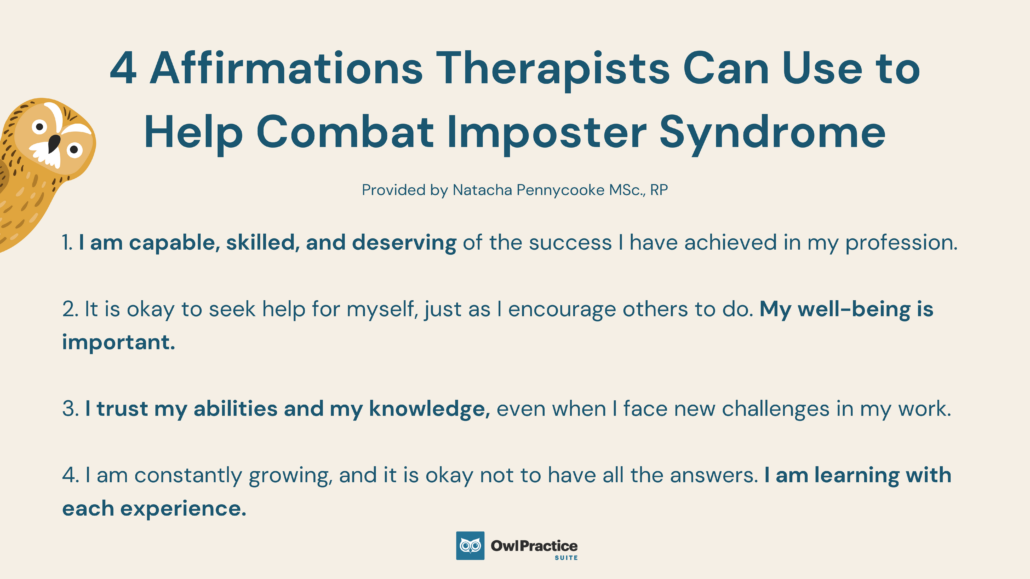As a seasoned psychotherapist, I find it hard to believe I’ve been doing this work for over 14 years. I enjoy working with, teaching, and supporting new therapists as they navigate the often scary world of being an early career professional. I, for one, remember this time all too well; and, even though I was fortunate to have amazing supervisors and colleagues to support me along the way, I struggled with my share of imposter syndrome. A few weeks ago while scrolling social media, a new therapist shared her worries, fears and disclosed feelings of impostor syndrome especially when seeing so many mental health professionals online. Understanding what she was feeling, I reached out. That week, we met virtually and had a great conversation around imposter syndrome, comparisonitis, and finding your own niche in the saturated field of new mental health professionals in the Greater Toronto Area (GTA).
Imposter syndrome is the pervasive feeling of being a fraud despite abundant evidence of your competence. It is a phenomenon that affects professionals across various industries. However, it can be particularly challenging for those in mental health professions, where the responsibility to provide effective care can be literally life or death. Both new and seasoned professionals in the field are not immune to these feelings that manifest as self-doubt, fear of failure, fear of maintaining success, and an overwhelming belief that one’s achievements are undeserved.
Understanding Imposter Syndrome in Mental Health Professionals
The reason why imposter syndrome can be especially tricky in this profession is because psychotherapists, psychologists, and social workers are expected to project confidence, competence, and emotional stability. The very nature of the work—dealing with complex human emotions, providing support during crises, and guiding clients through their healing journeys—demands a high level of self-assurance. When a therapist feels like an imposter, it can create an internal conflict: How can I help others if I can’t even believe in myself?
In my work, I have found that this phenomenon can stem from various sources, including the high expectations placed on mental health professionals to be emotionally “perfect”, the constant comparison to peers and mentors, and the limited representation of therapists practicing modalities that address racial, cultural, gender, and intersecting identities. Furthermore, for those new to the field, the transition from academic theory to real-world practice can be daunting, and the learning curve is steep. Meanwhile, seasoned professionals may grapple with self-doubt as they take on more complex cases, build a team, and step into leadership roles.
The Impact on Mental Health Professionals
Imposter syndrome can come with significant consequences. It can lead to burnout, as individuals push themselves to overcompensate for their perceived inadequacies. The constant fear of being “found out” can contribute to anxiety and depression, further impacting their ability to provide effective care. Additionally, these feelings of self-doubt can hinder professional growth, as individuals may shy away from opportunities for fear of failure or being exposed.
There is often a stigma around mental health professionals seeking help for themselves, which can make the issue worse. The unspoken faulty assumption that “those who provide care shouldn’t need it”, can lead to hesitation in addressing personal struggles with imposter syndrome. This belief is flawed, as many in the field are drawn to the profession to provide the support they themselves may have lacked during difficult times. As a result, unresolved feelings of inadequacy can create a cycle of deepening self-doubt.
Strategies for Combating Imposter Syndrome
- Acknowledging the Feelings: The first step is recognizing that imposter syndrome is common, especially in high-pressure professions like mental health, can help normalize experiences and reduce the sense of shame and isolation.
- Seeking Support: Building a support network of peers, mentors, and supervisors can provide valuable perspective. Discussing these feelings with trusted colleagues can help demystify the feelings and reinforce that the thoughts are not reflective of one’s actual competence. Supervision and consultation groups can be particularly helpful for both new and seasoned professionals.
- Reflecting on Achievements: Keeping a record of successes, positive client outcomes, and feedback can serve as a tangible reminder of one’s skills and achievements. Reflecting on these moments can help counterbalance the negative self-talk associated with imposter syndrome.
- Continuous Professional Development: Engaging in ongoing education and training can help bolster confidence. By staying current with the latest research and techniques, professionals can feel more secure in their knowledge and abilities. For seasoned professionals, mentoring newer colleagues can also reinforce their own expertise and experience.
- Practicing Self-Compassion: As mental health professionals we often encourage clients to practice self-compassion, yet may struggle to extend the same kindness to ourselves. Recognizing that perfection is unattainable and that mistakes are part of the learning process can help mitigate the harsh self-criticism that fuels imposter syndrome.
- Using Affirmations: Affirmations are an amazing way to reframe the mind, practice self-compassion and shift our thoughts on reality, instead of on feeling like an imposter. Here are 4 affirmations I love to use:

- Seeking Therapy, Supervision and Coaching: Just as clients benefit from therapeutic support, mental health professionals can also benefit from therapy, supervision and coaching. Working with a therapist who understands the unique challenges of the field can provide a safe space to explore and address imposter syndrome. Supervision is equally essential, offering both new and seasoned professionals the opportunity to gain insight, receive feedback, and develop confidence in their clinical skills. For new professionals, supervision helps bridge the gap between theory and practice, while seasoned therapists can gain guidance on complex cases and clinical responsibilities. Coaching can support the steep learning curve for new professionals when battling imposter syndrome, and can provide guidance to seasoned therapists who transition into leadership roles.
As a therapist, finding a mental health professional can be a challenging process, especially if you are well known in the professional circle. I suggest starting your search by asking your network for a referral, or searching for a mental health professional who specializes in working with therapists. It also may be helpful to interview those who are out of province, as this can decrease the possibility of sharing the same professional circle of friends.
Conclusion
Imposter syndrome is a common but manageable challenge for both new and seasoned mental health professionals. By acknowledging these feelings, seeking support, reflecting on achievements, and engaging in continuous professional, and personal development, individuals can navigate and overcome the self-doubt that imposter syndrome brings. In doing so, we not only improve our own well-being but also enhance our ability to provide the highest level of care to our clients. As mental health professionals, we must remember that we, too, are deserving of the same care and compassion we offer to others.
To break the cycle of self-doubt and foster personal and professional growth, consider seeking additional support through supervision or coaching. Whether you’re a new therapist needing guidance or a seasoned professional looking to deepen your practice, signing up for supervision or coaching can provide the space to explore your challenges in a safe, collaborative environment. This approach to managing imposter syndrome will not only benefit you individually, but will also contribute to a more resilient and supportive mental health community.
Take the next step in your journey by signing up for supervision and/or a coaching strategy session today, and let’s work together to build a more confident, empowered you.
Book a coaching strategy session

Book a free demo!
Reduce clinical administrative tasks and transform more lives with Owl Practice. Owl Practice provides all the tools you need to make your practice successful. Join the thousands of care professionals using Owl to run their practice every day.



